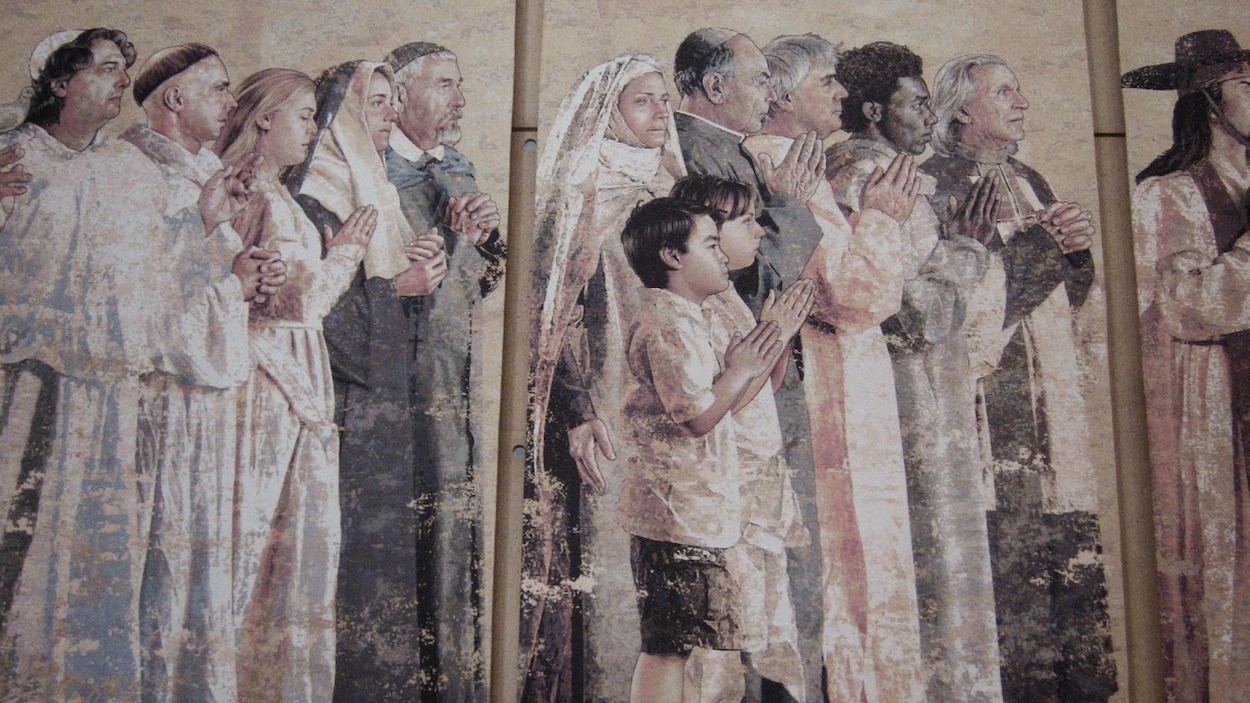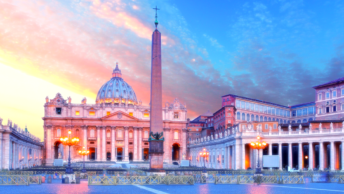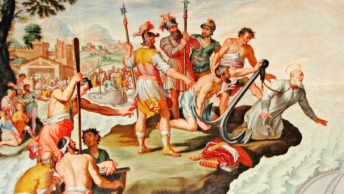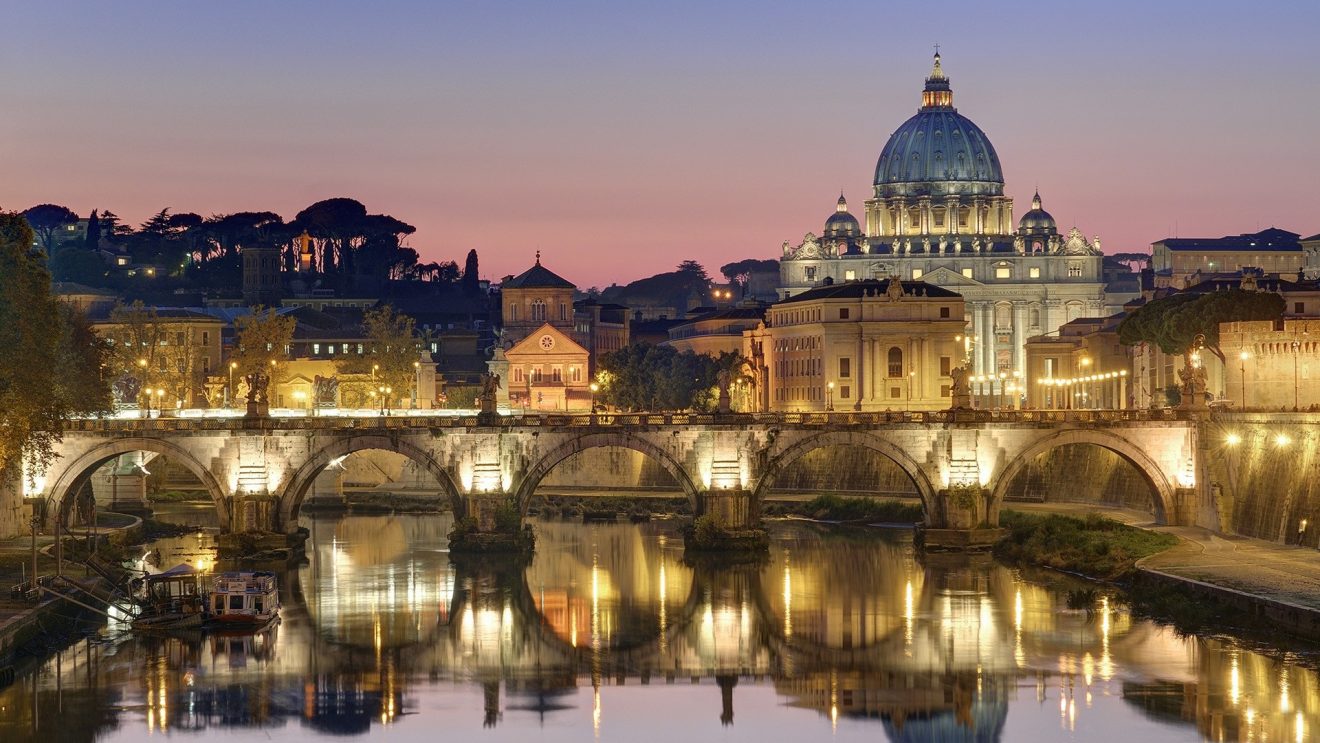Not long ago a friend asked me why, with all the scandal and disappointment within the hierarchy in the Catholic Church, I haven’t left and joined a church more in keeping with the Gospel? “After all,” he added, “you yourself have lamented these matters in your essays.” It was a fair enough question, and I responded by explaining why I have chosen to remain.
I began by saying, “The Catholic Church is my spiritual home, and I love it for good reason. It is the oldest Church of Christ and can trace its history directly back to St. Peter and the other apostles. And that’s not all. Its contribution to Christian thought and tradition over the centuries is unparalleled. Its teachings have led innumerable men and women to lead lives of heroic sanctity and to inspire billions of others to follow their example. It has maintained the sacraments, most importantly the Eucharist, through the ages.”
At this point, my friend asked, “Aren’t there other Christian churches that diligently follow the teachings and example of Jesus?”
“Of course,” I answered, “and I respect them and their members and honor their example.”
He clearly thought my answer was evasive because he then asked whether I believe the Catholic Church is better than those churches.
It was a challenging question, and I thought about for a moment, and then responded: “I wouldn’t use the word better because that suggests more holy and thus more pleasing to God. I would instead say fuller, meaning it has expressed Christ’s message more consistently and completely than other Christian churches.”
“Do you then believe that Catholics lead more holy lives than members of other Christian churches?” Another challenging question.
“No, I do not,” I answered. “To begin with, I make a distinction between churches and individual believers. The holiness of individuals depends not on what church they belong to but on their responses to what Christ called the two greatest commandments—loving God and loving neighbor. Those commandments apply to every person,and our response depends on two factors—the Holy Spirit’s invitation, and our acceptance of it. I believe the former is offered to everyone but the latter must be freely chosen.”
I continued, “Furthermore, I believe that the roster of saintly individuals, which only God knows in full, includes Methodists, Pentecostals, Mormons, Catholics, members of other denominations, and even people of no denomination. I mention the last group because, as Jesus taught, getting to heaven is not a matter of claiming to be virtuous but of practicing virtue. [Matt 7:21] Also, because I have personally known people of different faiths, and a few of no formal faith, who have excelled in that practice, as well as some who claim great faith but whose behavior suggests otherwise.”
“Speaking of saintliness, the Catholic Church is the only Christian denomination that has consistently throughout the centuries honored the great saints. And that is one of the most important reasons I remain in the Church. I know that some people say the Catholic Church encourages not just venerating the saints but, in effect, worshipping them. That charge is made in particular about the Blessed Virgin Mary. But it is false. The Church honors the Second Commandment, which forbids worship of anyone or anything other than God.”
My friend interjected, “Are you suggesting that no Catholic has never crossed the line between venerating (deeply respecting) the saints and worshipping them?
I answered, “No, I would not say that anymore than I would say that Catholics never sin against the other nine Commandments. Catholics are sinners like everyone else. In fact, I believe that precisely because they are more inclined to venerate the saints, especially the Blessed Virgin Mary, than other Christians are, they are more prone to excessive veneration. Without question, doing so is wrong no matter what the circumstance or how strong the temptation. Nevertheless, I can understand how it can happen. Veneration is a form of respect, admiration, and yes, love. The more we learn of St. Francis of Assisi, the man who is said to have lived more like Christ than anyone else in history, the more we are inspired by his example. The more we know of St. Teresa of Calcutta’s sacrifices in caring for the poorest of the poor, the more we are filled with admiration and love. Those reactions are normal and spiritually wholesome, but we must nevertheless remember that saints are human and therefore should never be treated as divine.”
“Mary, the mother of Jesus, evokes considerably more admiration and love than the greatest of the saints because her situation was unique. Her response to the Annunciation when the angel told her that she had found favor with God was simply, “Let it be done to me according to your word.” She then went on to say with humble joy, ‘My soul proclaims the greatness of the Lord, my spirit rejoices in God my Savior for he has looked with favor on his lowly servant. From this day all generations will call me blessed.’” [Luke 1]
I continued, “Mary lived closer to God the Father than anyone else in human history. In a way that surpasses our understanding, she was the bride He chose to carry His Son in her womb, teach him in childhood, care for him in manhood, and suffer as only a mother could during His Passion and death.”
“Catholics pray to the saints and especially to Mary, but the prayers they offer to them are not the same as the prayers they offer to God. They are instead the kind of prayer both Protestants and Catholics ask our families and friends to offer for us when we are ill or troubled. They also represent what is referred to in the Apostle’s Creedas the ‘communion of saints.’ Essentially the creed is saying that we can communicate with the departed saints, and they can communicate with God on our behalf. And the saint most often prayed to in that way is the Blessed Virgin Mary. There is one powerful passage in the Bible [John 2] that suggests the wisdom of doing so; ‘When the wine ran out, the mother of Jesus said to Him, ‘They have no wine.’ And Jesus objected, ‘My hour has not yet come.’ His mother [then] turned and said to the servants, ‘Whatever He tells you, do it.’ And Jesus performed his first miracle.”
“I have always found that passage striking and profound in its implications. His mother asked and He was willing to change the divine plan to grant her request. The passage hints at the depth of the relationship of Mary and Jesus, which far exceeds our capacity to understand. It also gives hope that whatever petition of ours she makes to her son will win His favor. And that is why Catholics pray in this manner to the mother of our Savior.”
At this point, my friend said our discussion was helping him understand how I feel about the Catholic Church and its values and traditions, but then he added this: “But your essays about the state of the Catholic Church are not about Mary and the saints. Those writings are about your disgust at the lack of humility and the cluelessness of many Catholic leaders. Doesn’t that disgust undermine your trust in their leadership?”
I said, half jokingly, that though “cluelessness” is not a theological term, it would make a good one, then said, more seriously, “Yes, I am often disturbed, disgusted, and more than that—angry and at times incensed with them. But I understand that Jesus felt the same way toward the church leaders of His time. He called them hypocrites and chastised them for turning His Father’s house into a den of thieves. Nor was He always satisfied with the behavior of His apostles, notably James and John who asked for places of honor in heaven, Judas who betrayed him for money, Peter who denied Jesus twice to those who would kill Him, and Thomas who demanded evidence before believing.”
“Yet Jesus didn’t give up on His apostles,” I added, “so what business do I have giving up on their modern counterparts, the present priestly hierarchy? It would be arrogant and faithless for me to do so! Besides, if I want forgiveness for my own sins and failures, I had better forgive my neighbors for theirs. In fact, I (sometimes grudgingly) affirm that requirement every time I recite the Lord’s Prayer and say, ‘forgive us our trespasses as we forgive those who trespass against us.’ When I say those words, I can’t help imagining that Jesus delighted in giving them to us because they offer singular protection from the sin of being unforgiving. Not so incidentally, I am grateful that those words keep me from giving up on bishops, cardinals, and popes when they act foolishly, irrationally, and irresponsibly.”
I went on, “Closely related to the command to forgive our neighbors is the command not to judge others: ‘Judge not let you be judged.’ ’Let him who is without sin cast the first stone.’ ‘Judgment is mine, saith the Lord.’ Unfortunately, that command is frequently misunderstood. Though unequivocal, it is limited in scope to the matter of judging people’s intentions and mental states. To be more specific, it says don’t presume what they say or do is out of malice or some form of ignorance, including invincible ignorance. We can’t get into people’s minds or hearts; only God can. Therefore we are not to judge what is in their minds or hearts.”
“However, there is an exception to the command to ‘judge not’—it does not apply to judging the truth or falsity, foolishness or wisdom of what our neighbors say or do. In fact, we are not only permitted to judge those things; we are obligated to do so. Shortly after the command not to judge [Matt 7:1-5], Jesus said, ‘Beware of the false prophets, who come to you in sheep’s clothing, but inwardly are ravenous wolves. You will know them by their fruits.’ Such knowing can only come from evaluating (that is, judging) their fruits. Jesus then offered this guidance: ‘Ask, and it will be given to you; seek, and you will find; knock, and it will be opened to you. For everyone who asks receives, and the one who seeks finds, and to the one who knocks it will be opened.’ We must note that Jesus did not advise sitting passively and waiting for God to give us these things. He said we are to be active by asking, seeking, knocking.”
That last sentence is a crucial one. It adds clarity to what I said to my friend and repeated here. I remain Catholic because I love the Catholic faith and want to grasp its meaning ever more fully and to share that understanding with others. The way to do so is to use my God-given intellect and follow Jesus’ direction to “ask” meaningful questions, “seek” truth, and “knock” at the door of wisdom concerning both secular and religious issues. In both matters, I assume only that the Holy Spirit offers guidance to all seekers, not that all seekers interpret that guidance correctly and follow it diligently. To make the latter assumption would deny Original Sin and the imperfection of human nature. The question must always be whether what people—laypeople or clerics—teach or practice is consistent with the will of God.
Copyright © 2021 by Vincent Ryan Ruggiero. All rights reserved







